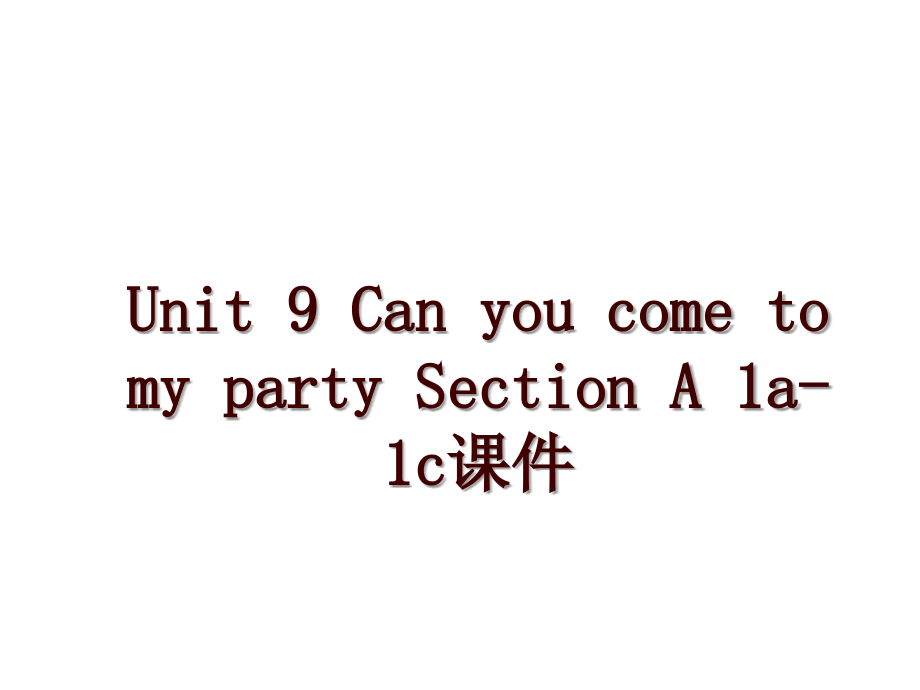《Unit 9 Can you come to my party Section A 1a-1c課件》由會(huì)員分享�����,可在線閱讀���,更多相關(guān)《Unit 9 Can you come to my party Section A 1a-1c課件(44頁(yè)珍藏版)》請(qǐng)?jiān)谘b配圖網(wǎng)上搜索����。
1、Unit 9 Can you come to Unit 9 Can you come to my party Section A 1a-my party Section A 1a-1c1c課件課件Unit 9 Can you come to my party?A:Canyouswim?B:Yes,Ican./No,Icant.A:Canyouplayfootball?B:Yes,Ican./No,Icant.表示能力的回答表示能力的回答LanguageGoals:MakeinvitationsDeclineinvitationsacceptinvitationsTalkaboutobligat
2���、ionsA:Canyoucometomybirthdayparty?A:Canyoucometomybirthdayparty?B:B:Sure,Idloveliketo.Sure,Idloveliketo.接受邀請(qǐng)的接受邀請(qǐng)的回答回答A:Canyoucometomybirthdayparty?A:Canyoucometomybirthdayparty?B:Sure,Idloveliketo.B:Sure,Idloveliketo.A:Canyoucometomybirthdayparty?B:Sorry,Icant.Ihaveto拒絕邀請(qǐng)拒絕邀請(qǐng)的回答的回答help my parents.W
3�����、orkinpairsWorkinpairsA:Canyoucometomybirthdayparty?B:Sorry,Icant.自由操練自由操練自由操練自由操練 可參考圖片可參考圖片可參考圖片可參考圖片Ihavetoprepareforanexam.Explanation 1.can的用法的用法()表邀請(qǐng)。()表邀請(qǐng)�。若接受邀請(qǐng),若接受邀請(qǐng)��,回答為:回答為:OK./Allright./Sure./Ofcourse./Certainly./Yes(Sure),Idlove(like)to.若不接受邀請(qǐng)��,若不接受邀請(qǐng)����,回答為:回答為:Sorry,cant.(+原因原因)eg.Canyoucome
4、totheparty?Yes/Sure,Idlove/liketo.Sorry,Icant.Ihavetohelpmyparents.其他表邀請(qǐng)的句型其他表邀請(qǐng)的句型:1)Could/Will/Wouldyoucometotheparty?2)Wouldyoulike/lovetocometotheparty?3)Ihopeyoucometotheparty.4)Pleasecometotheparty.5)How/Whataboutcomingtotheparty?()表能力()表能力“能����,會(huì)能,會(huì)”否定句否定句cant不能不能eg.Hecanswim,butIcant.Howlongcan
5��、youstayunderwater?()在否定句����,()在否定句����,疑問(wèn)句中表示疑問(wèn)句中表示“不可能不可能”或或“一定一定不不”eg.Canhecome?No,hecantcome.(他會(huì)來(lái)嗎(他會(huì)來(lái)嗎���?不�,他不能來(lái))�����?不�,他不能來(lái))2.情態(tài)動(dòng)詞情態(tài)動(dòng)詞“haveto”與其他的情態(tài)與其他的情態(tài)動(dòng)詞如:動(dòng)詞如:“can”,“may”“must”和和“should”不同。不同��。(1)這)這4個(gè)情態(tài)動(dòng)詞沒(méi)有人稱和個(gè)情態(tài)動(dòng)詞沒(méi)有人稱和數(shù)的變化數(shù)的變化,而而haveto有����。它的第三有。它的第三人稱單數(shù)為人稱單數(shù)為“hasto”,過(guò)去時(shí)為過(guò)去時(shí)為hadto,如:如:Heshouldstudyhard.他應(yīng)該好
6���、好學(xué)習(xí)���。他應(yīng)該好好學(xué)習(xí)���。Hehastostudyhard.他不得不好好學(xué)習(xí)。他不得不好好學(xué)習(xí)���。(2)這)這4個(gè)情態(tài)動(dòng)詞在一般疑問(wèn)句中個(gè)情態(tài)動(dòng)詞在一般疑問(wèn)句中將它們放在句首將它們放在句首,在否定句中直接在他在否定句中直接在他們后邊加們后邊加not即可���。即可。我們以我們以can為例為例:Canhegowithus?他能和我們一起去嗎�����?他能和我們一起去嗎���?Hecantgowithus.他不能和我們一起去。他不能和我們一起去�。而而“haveto”要加助動(dòng)詞要加助動(dòng)詞do,hasto要加助動(dòng)詞要加助動(dòng)詞does,還原還原h(huán)avetohadto要加助動(dòng)詞要加助動(dòng)詞did,還原還原h(huán)aveto才可能完成其疑
7、問(wèn)�、否定句。才可能完成其疑問(wèn)����、否定句。試將下面三種話分別寫(xiě)成試將下面三種話分別寫(xiě)成(1)一般疑問(wèn)句����,并做肯定回答��。)一般疑問(wèn)句�,并做肯定回答�����。(2)否定句��。)否定句��。1:Theyhavetogototheparty.Dotheyhavetogototheparty?Yes,theydo.Theydonthavetogototheparty.2:Hehastogotoseethedoctor.Doeshehavetogotoseethedoctor?Yes,hedoes.Hedoesnthavetogotoseethedoctor.3:Shehadtohaveapianolessonyester
8��、day.Didshehavetohaveapianolessonyesterday?Yes,shedid.Shedidnthavetohaveapianolessonyesterday.2.have to強(qiáng)調(diào)客觀上需要做某事����,即表示外界強(qiáng)調(diào)客觀上需要做某事,即表示外界條件的需要不得不做某事����,含有條件的需要不得不做某事,含有“客觀所迫客觀所迫”的的意味��,它有人稱和數(shù)的變化,可用于多種時(shí)態(tài)中�����,意味����,它有人稱和數(shù)的變化,可用于多種時(shí)態(tài)中�,否定式為否定式為“不必不必”。must強(qiáng)調(diào)說(shuō)話者主觀上認(rèn)為必須做某事���,含強(qiáng)調(diào)說(shuō)話者主觀上認(rèn)為必須做某事�,含有有“主觀判斷主觀判斷”的意味����,它的否定式意為的意味�����,它的
9���、否定式意為“禁止��,禁止�����,不允許不允許”�。eg.If one gets ill,hell have to see a doctor.She has to go to school by bus.We must go to school on time.-Must I finish the homework now?-Yes,you must./No,you neednt(dont have to).You mustnt play football in the classroom.3.Ihavetohelpmyparents.我不得不幫助我的父母。我不得不幫助我的父母�。helpsb.withst
10、h.或或helpsb(to)dosth.上一句我們可以說(shuō):上一句我們可以說(shuō):Ihavetohelpmyparentswiththehousework.或說(shuō)或說(shuō)Ihavetohelpmyparents(to)dothehousework.4.have 構(gòu)成的短語(yǔ)構(gòu)成的短語(yǔ)1)have a rest/look/swim/walk2)have a meeting/class/lesson/drink(喝一杯飲料)(喝一杯飲料)/party3)have breakfast/lunch/supper(dinner)/meals4)have a good time/have fun(in)doing st
11��、h.5)have a try 試一試試一試6)have sth on穿戴著(不可用進(jìn)行時(shí))穿戴著(不可用進(jìn)行時(shí))be wearing eg.But he has nothing on.可他什么也沒(méi)穿�����?��?伤裁匆矝](méi)穿�����。7)have/let/make sb.do sth.=get sb.to do sth.讓某人做某事讓某人做某事8)have sth.done請(qǐng)叫某人做某事請(qǐng)叫某人做某事eg.I have the students answer my questions.我讓學(xué)生回答我讓學(xué)生回答我的問(wèn)題�����。我的問(wèn)題�。Tim will have his hair cut tomorrow.Tim 明天
12、要去理明天要去理發(fā)��。Can youA:Can you come to my birthday party?B:Sorry,I cant.I have the flu.=I have a cold.=I catch a cold.Can you A:Can you come to my birthday party?B:Sorry,I cant.Ihavetogotothedoctor.Can youA:Can you come to my birthday party?B:Sorry,I cant.I have to meet my friend Today we have learnt ho
13��、w to say“yes”or“no”to someones invitation and give a reason.1)Can you?常用于發(fā)出邀請(qǐng)常用于發(fā)出邀請(qǐng).在口語(yǔ)也用在口語(yǔ)也用would you like to?Could you?2)Sure,Id love to.這是對(duì)邀請(qǐng)的肯定回答這是對(duì)邀請(qǐng)的肯定回答,表表示接受邀請(qǐng)示接受邀請(qǐng).Sure用于口語(yǔ)用于口語(yǔ),相當(dāng)于相當(dāng)于Certainly,yes.3)Sorry,I cant.是對(duì)是對(duì)邀請(qǐng)的否定回答��。邀請(qǐng)的否定回答��。Have to“不得不不得不,必須必須”,三單用三單用has to.A:Canyoucometomyparty?B
14��、:Imsorry.Ihavetohelpmymom.A:Canyouplaytennis?B:Sure,Idloveto.CanyouA:Canyoucometomyparty?B:Sure,Idloveto.A:Canyougotothemall?B:Imsorry.Imgoingtothemovies.Canyou1a.Matchthewordswiththepictures.Match the words with the picturesa-eprepare for an eaxmmeet my friendhave the flugo to the doctorhelp my par
15����、ents1.Prepareforanexam_2.helpmyparents_3.gotothedoctor_4.meetmyfriend_5.havetheflu_Check the answers!bcdea1bListenandwritethenames(Tim,Kay,AnnaandWilson)nexttothecorrectstudentsinthepicture.TimAnna Kay Wilson 1.Ihavetohelpmyparents.我不得不幫助我的父母。我不得不幫助我的父母��。helpsb.withsth.或或helpsb(to)dosth.上一句我們可以說(shuō):上一句我
16��、們可以說(shuō):Ihavetohelpmyparentswiththehousework.或說(shuō)或說(shuō)Ihavetohelpmyparents(to)dothehousework.Languagepointshttp:/ lovetoCancant單項(xiàng)選擇單項(xiàng)選擇1.Ihave_homeworktodo.A.toomanyB.toomuchC.muchtooD.afew2.He_stayathome,becausehismotherwasill.A.hastoB.havetoC.hadD.hadto3.Iwenttothemountain_.A.nextweekB.thedayaftertomorrow
17��、C.yesterdayD.tomorrowBDC4._Fridaymorning,Iliketogotothemovie_friends.A.In,onB.On,withC.On,andD.At,with5.Wouldyouplease_me_thehousework?A.help,inB.tohelp,withC.help,doingD.help,doB D6.Areyou_footballthisweekend?A.playingB.playC.playaD.Plays7.Ihavetogotomyguitarlesson_19:00_20:00_theevening.A.from,to,onB.in,at,onC.from,to,inD.at,at,onA C
 Unit 9 Can you come to my party Section A 1a-1c課件
Unit 9 Can you come to my party Section A 1a-1c課件

